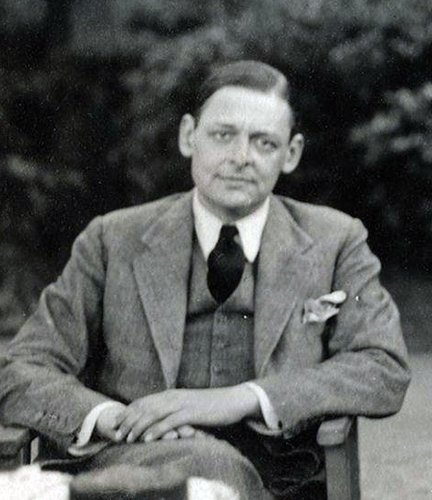T.S. Eliot Quotes
“I have measured out my life with coffee spoons;”
The Love Song of J. Alfred Prufrock (1915)
Source: The Love Song of J. Alfred Prufrock and Other Poems
Context: Do I dare
Disturb the universe?
In a minute there is time
For decisions and revisions which a minute will reverse.
For I have known them all already, known them all: —
Have known the evenings, mornings, afternoons,
I have measured out my life with coffee spoons;
I know the voices dying with a dying fall
Beneath the music from a farther room.
“This is one moment, / But know that another / Shall pierce you with a sudden painful joy.”
Source: Murder in the Cathedral
“He who was living is now dead
We who were living are now dying
With a little patience.”
Source: The Waste Land
Source: Four Quartets
Variant: The awful daring of a moment's surrender
Which an age of prudence can never retract
By this, and this only, we have existed
Source: The Waste Land (1922)
Source: The Love Song of J. Alfred Prufrock and Other Poems
“I am glad you have a Cat, but I do not believe it is So remarkable a cat as My Cat.”
Letter to his godson, Thomas Erle Faber (January 1931) as quoted in "T.S. Eliot's Private Letters To Faber Publishing Family To Be Sold" at World Collector's Net http://www.worldcollectorsnet.com/news/newstories/news736.html (12 August 2005)
Source: Four Quartets
Context: I am glad you have a Cat, but I do not believe it is So remarkable a cat as My Cat. My Cat is a Lilliecat Hubvously. What a lilliecat it is. There never was such a Lilliecat. Its Name is JELLYORUM and its one Idea is to be Usefull!!
Tradition and the Individual Talent (1919)
Source: Four Quartets
Context: The historical sense involves a perception, not only of the pastness of the past, but of its presence; the historical sense compels a man to write not merely with his own generation in his bones, but with a feeling that the whole of the literature of Europe from Homer and within it the whole of the literature of his own country has a simultaneous existence and composes a simultaneous order. This historical sense, which is a sense of the timeless as well as of the temporal and of the timeless and of the temporal together, is what makes a writer traditional. And it is at the same time what makes a writer most acutely conscious of his place in time, of his contemporaneity.
“It is impossible to say just what I mean!”
The Love Song of J. Alfred Prufrock (1915)
Source: The Love Song of J. Alfred Prufrock and Other Poems
Context: It is impossible to say just what I mean!
But as if a magic lantern threw the nerves in patterns on a screen:
Would it have been worth while If one, settling a
Pillow or throwing off a shawl,
And turning toward the window, should say:
"That is not it at all,
That is not what I meant, at all."
“Winter kept us warm, covering
Earth in forgetful snow”
Source: The Waste Land
The Love Song of J. Alfred Prufrock (1915)
Source: Selected Poems
“Shall I part my hair behind? Do I dare to eat a peach?”
Source: The Love Song of J. Alfred Prufrock and Other Poems
Ash-Wednesday (1930)
“I think we are in rats’ alley
Where the dead men lost their bones.”
Source: The Waste Land
“The last temptation is the greatest treason: To do the right deed for the wrong reason.”
Variant: The last act is the greatest treason. To do the right deed for the wrong reason.
Source: Murder in the Cathedral
Source: The Waste Land and Other Poems
“For he will do
As he do do
And there's no doing anything about it!”
Source: Old Possum's Book of Practical Cats
Source: The Waste Land and Other Poems
Source: Christianity and Culture: The Idea of a Christian Society and Notes Towards the Definition of Culture
“Now that the lilacs are in bloom
She has a bowl of lilacs in her room”
Source: Collected Poems, 1909-1962
“Oh, do not ask, 'What is it?'/Let us go and make our visit.”
Source: The Love Song of J. Alfred Prufrock and Other Poems
Variant: We must not cease from exploration. And the end of all our exploring will be to arrive where we began and to know the place for the first time.
Source: Four Quartets
